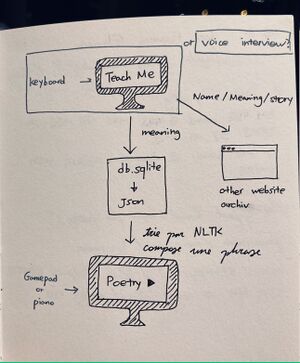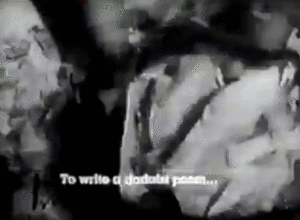User:Euna/Graduation
Draft Project Proposal
What to make?
For my graduation project, I’m making a digital spaces(web) where the visitors experience how far one word can be extended and they enjoy the poetic aspect coming from the linguistic differences. This will be a virtual world where none of the linguistic variation is considered as « wrong », but rather as a poetic license.
To be more specific, they are invited to go through three stages; responded to a pronunciation, tell their meaning, check the other’s meaning and play with collected meanings.
- Registration web
A spectator listens to pronunciation and registers its personal or lexical meaning and its origin. These inputs are saved as Json file.
- Archive web
This is the space where databases from json file are showed in Dictionary form.
- Poetry web
When a spectator press a piano keyboard, a sound-pronunciation is played. At the same time, a screen displays randomly one of the meanings related to sound. As more button is pressed, the text is developed from one word to a sentence. This means I preset a structure of the sentence, like S+V+O and the python takes out one of nouns, verbs, and nouns respectively.
Personal Context
From my bachelor’s degree in graphic design in France, the language and its interpretation are the centers of interest of my projects. To be an editorial designer, I should understand visual and textual language, and how it could be perceived by readers. And as a foreign speaker, every day I’ve encountered the linguistic collision between Korean, French, and English; especially the homonym between different languages. For this reason, I enjoy testing the limits of linguistic elements, and this leads to huge affection for concrete poetry. My previous work Si(2018, poems about homonyms between French and Korean), Merchandise Poetry(2019, algorithmic poems from barcode number) and Standart Dictionary (2020) are related.
Larger context
The linguistic question has been treated by Dada, Fluxus and Oulipo through their poetry and by Derrida through his deconstruction theory. And my attempt to connect language questions with computational poetry is not a coincidence. According to « Prehistoric Digital Poetry Book » by Chris Funkhouser, the first computational poetry started as an artistic response to Derrida around 1965, the accidental relation of signified/signifier and of infinite potentials of text. I see the difference in my poetry is the use of collective intelligence. This make much more différance which permits approaching toward the transcendental signified.
Methodology
Research keyword
- Computational writing
- computational poetry
- sound poetry
- translation
- language
- Collective archive
- Participatory art
- Collective intelligence
Possible question
- How can I choose the pronunciation?
- For registration web, which information do I need?
- Do I collect participant's voice?
Who can help
- Manetta and Michael for conceptual and technical matters.
- Nicoline van Harskamp as she works on modification of the English language by its non-native speakers
- Participants from various backgrounds to nourish my database.
Timetable
These are the key dates for 2021-22
19 November - Graduate Proposal Deadline Last year's Graduate Proposals UPLOAD YOUR PROPOSAL HERE! 19 November - Thesis Outline Deadline Last year's Thesis OutlinesUPLOAD YOUR THESIS OUTLINE HERE! 3 Dec - Deadline First Chapter 18 Feb - Deadline First Draft Thesis 18 March - Deadline Second Draft thesis (texts to 2nd readers) 1 April - Deadlines Second readers' comments 14 April - DEADLINE THESIS
- Oct - Nov
Make a php website to collecting the meaning
Test the collection (vocal interview and small meaning exchange exercise)
Continue to read
- Dec - Jan
Continue to collect the meaning (invite the people actively)
Make a collective dictionary
- Feb - March
Make a web for the poetry (Json database as NLTK source and compose phrase)
- April - May
Make all webs and installation work
References
Read
- Vilem Flusser, Does writing have a Future?
- Chris Funkhouser, Prehistoric Digital Poetry Book
- Nicoline van Harskamp, My Name Is Languages
- Olia Lialina, Digital Folklore
- Ivan Junqueira, Is poetry untranslatable? (https://hogeschoolrotterdam.on.worldcat.org/v2/search/detail/8598237785?queryString=Untranslatable%20Terms%20Of%20Cultural%20Practices&stickyFacetsChecked=on&clusterResults=true&groupVariantRecords=false)
- Michaële Hancher, Humpty Dumpty and verbal meaning (https://www.jstor.org/stable/430352?origin=crossref)
Project
- Antoni Muntada, The file Room, https://rhizome.org/editorial/2016/nov/17/antoni-muntadas-the-file-room/
- Antonio Roberts AKA Hellocatfood commission, http://www.electronicvoicephenomena.net/index.php/sp3l-aend-spik-antonio-roberts-aka-hellocatfood-commission/
- Transcommunautaire Karaoke Transcommunautair, https://gallery3.constantvzw.org/index.php/Transcommunautaire-Karaoke-Transcommunautair
- ParlezVous1016, https://www.parlezvous1060.be/fr/w/Allumette.html
- Steve Reich’s Different Trains https://www.youtube.com/watch?v=qcGqVynCPaw


